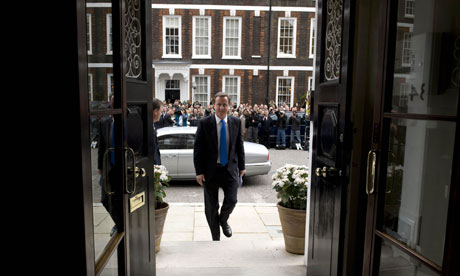Interestingly, one of their first moves will be to enact legislation fixing the term of Parliament at 5 years. Under current law, a Parliament may last up to 5 years, but a Prime Minister may dissolve Parliament, thereby causing an election, earlier if he or she chooses. The move may help to solidify the coalition (allaying Liberal Democrat fears that the Conservatives would call new elections once their polling looked better, gain a majority, and kick them out) but it also seems like good government (prohibiting a politically motivated call for a new election by the party in power for the purposes of political advantage.
Still, this could have profound effects on the entire British political system, and render it looking much more like that of the U.S. in several ways.
For example, suppose the Prime Minister loses the majority. Would Britain be stuck with a prime minister who lacks majority support in the Parliament? If so, it could come to resemble the US system, where the President and Congress frequently do not come from the same party, a little bit more.
More importantly, it would also likely end the tradition of short, inexpensive campaigns because candidates will know exactly when the elections will be and can start campaigning earlier than the usual 30 day window from when the PM announces an election and when it takes place. Such a change may wind up with very profound effects. As a result of longer, more expensive campaigns, voters may wind up paying less attention and fewer going to the polls.

No comments:
Post a Comment